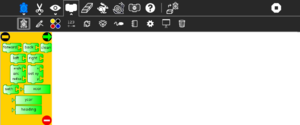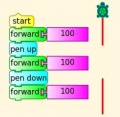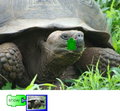Homepage | Activities | Events | Lists | Development | Translate | Contact
Difference between revisions of "Activities/Turtle Art/Getting started"
< Activities | Turtle Art
Jump to navigation
Jump to search
Tonyforster (talk | contribs) |
Tonyforster (talk | contribs) |
||
| Line 30: | Line 30: | ||
File:Collapsestack.jpg|Collapse a 'stack' of blocks to save space | File:Collapsestack.jpg|Collapse a 'stack' of blocks to save space | ||
File:Pushpop.jpg|Store data in the first in last out heap using 'push' and 'pop' | File:Pushpop.jpg|Store data in the first in last out heap using 'push' and 'pop' | ||
| − | File:Turtlearray.jpg|Box names can be boxes, in this case 10 boxes are created. This is a powerful programming feature. | + | File:Turtlearray.jpg|Box names can be boxes, in this case 10 boxes are created. This is a powerful programming feature. A one dimensional array of variables has been effectively created. |
</gallery> | </gallery> | ||
Revision as of 22:37, 28 February 2011
Getting Started
Start by clicking on (or dragging) blocks from the Turtle palette. Use multiple blocks to create drawings; as the turtle moves under your control, colorful lines are drawn.
You add blocks to your program by clicking on or dragging them from the palette to the main area. You can delete a block by dragging it back onto the palette. Click anywhere on a "stack" of blocks to start executing that stack or by clicking in the Rabbit (fast) , Turtle (slow) or Bug (debug) buttons ![]() on the Project Toolbar.
on the Project Toolbar.
The basics
Drawing shapes
Boxes, Stacks and the Heap
(aka variables, subroutines and the stack)
Displaying things
Keyboard, mouse and sensor input
Getting a multi digit number [[1]]


























